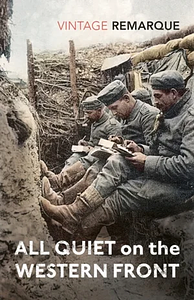Take a photo of a barcode or cover
“I am no longer a shuddering speck of existence, alone in the darkness;—I belong to them and they to me; we all share the same fear and the same life, we are nearer than lovers, in a simpler, a harder way; I could bury my face in them, in these voices, these words that have saved me and will stand by me” (212).
writing style was haunting while being easy to understand at the same time. never felt so immersed when reading a war novel, and the exploration of the relationships between the young class of soldiers was especially interesting. last paragraph of the novel made me sit and stare at a wall for 10 minutes
writing style was haunting while being easy to understand at the same time. never felt so immersed when reading a war novel, and the exploration of the relationships between the young class of soldiers was especially interesting. last paragraph of the novel made me sit and stare at a wall for 10 minutes
“One thing I do know: everything that is sinking into us like a stone now, while we are in the war, will rise up again when the war is over, and that’s when the real life-and-death struggle will start.
The days, the weeks, the years spent out here will come back to us again, and our dead comrades in arms will rise again and march with us, our heads will be clear and we will have an aim in life, and with our dead comrades beside us and the years we have spent in the line behind us we shall march forward - but against whom, against whom?”
It’s pretty frightening to think that Erich Maria Remarque wrote those words in the mid-1920s not knowing what was lying ahead for Germany.
The best anti-war novel I’ve ever come across and a million times more nuanced than the recent film adaptation.
The days, the weeks, the years spent out here will come back to us again, and our dead comrades in arms will rise again and march with us, our heads will be clear and we will have an aim in life, and with our dead comrades beside us and the years we have spent in the line behind us we shall march forward - but against whom, against whom?”
It’s pretty frightening to think that Erich Maria Remarque wrote those words in the mid-1920s not knowing what was lying ahead for Germany.
The best anti-war novel I’ve ever come across and a million times more nuanced than the recent film adaptation.
challenging
dark
emotional
sad
tense
medium-paced
Plot or Character Driven:
A mix
Strong character development:
Yes
Loveable characters:
Yes
Diverse cast of characters:
Yes
Flaws of characters a main focus:
Complicated
"A man cannot realize that above much shattered bodies there are still human faces in which life goes its daily round. And this is only one hospital, one city station; there are hundreds of thousands in Germany; hundreds of Thousands in Russia; hundreds of thousands in France. How senseless is everything that can ever be written, done, or thought when such things are possible. It must all be of lies and of no account when the culture of a thousand years could not prevent this stream of blood being poured, in these torture chambers of hundreds of thousands. A hospital alone shows what war is."
Even as one of the greatest war-novels of all time simply for the language and brutality of its language and almighty power as an anti-war novel, the one thing I love about this book especially is how the descriptions of the sick, dead, dying soldiers and animals being tortured or slaughtered or killed endlessly shows no exaggeration nor secrecy. Remarque knew that wards could never describe the true horrors of war and even delved into this idea head-on during the chapter of this book when Baumer is on his very regrettable leave. Not only is this book disturbingly realistic and unnerving, there's also a fair dash of humor throughout the novel, which makes me cherish this book even more. I agree with the back-cover when it calls this the best war book ever... just maybe not the whole 'best' part. I'd put Slaughterhouse-Five above this, but All Quiet on the Western Front deserves the recognition and the acclaim. Above all: it is haunting.
Even as one of the greatest war-novels of all time simply for the language and brutality of its language and almighty power as an anti-war novel, the one thing I love about this book especially is how the descriptions of the sick, dead, dying soldiers and animals being tortured or slaughtered or killed endlessly shows no exaggeration nor secrecy. Remarque knew that wards could never describe the true horrors of war and even delved into this idea head-on during the chapter of this book when Baumer is on his very regrettable leave. Not only is this book disturbingly realistic and unnerving, there's also a fair dash of humor throughout the novel, which makes me cherish this book even more. I agree with the back-cover when it calls this the best war book ever... just maybe not the whole 'best' part. I'd put Slaughterhouse-Five above this, but All Quiet on the Western Front deserves the recognition and the acclaim. Above all: it is haunting.
challenging
dark
emotional
sad
tense
medium-paced
Plot or Character Driven:
Character
Strong character development:
Complicated
Loveable characters:
Complicated
Diverse cast of characters:
No
Flaws of characters a main focus:
Complicated
Allein mit Worten erschafft Remarque Unbehagen, Unverständnis, Übelkeit und einen tiefen Schnitt ins Herz. Große Antikriegsliteratur!
It is impossible for me to review this book. It is impossible to talk rationally about it, to engage with it on a literary and/or historical level. This is a book that is steeped in emotion and hopelessness, that has more than earned the title of "war classic".
This is a book far bigger than its 200 or so pages.
This is a book that words fail to define or adequately describe.
This is a book that I would review by weeping and repeating "this book, this book" or by listing adjectives that will never seem to be enough.
Often, I don't hold for books people must read, but this book has more that earned its place on that list.
I don't hold for hyperbolic descriptions of books – books that wholly represent a nation, a generation, a war, the lost generation of men who were all ruined by the war that was meant to end all wars – but I would make the exception for this.
All Quiet On The Western Front is an intrinsically emotional read. It is the perfect representation of the lost youth of World War I. It is beautiful, and terrible, an awesome read. You must read this book.
This is a book far bigger than its 200 or so pages.
This is a book that words fail to define or adequately describe.
This is a book that I would review by weeping and repeating "this book, this book" or by listing adjectives that will never seem to be enough.
Often, I don't hold for books people must read, but this book has more that earned its place on that list.
I don't hold for hyperbolic descriptions of books – books that wholly represent a nation, a generation, a war, the lost generation of men who were all ruined by the war that was meant to end all wars – but I would make the exception for this.
All Quiet On The Western Front is an intrinsically emotional read. It is the perfect representation of the lost youth of World War I. It is beautiful, and terrible, an awesome read. You must read this book.
dark
emotional
sad
tense
medium-paced
Plot or Character Driven:
Character
Strong character development:
Yes
Loveable characters:
Yes
Diverse cast of characters:
Complicated
Flaws of characters a main focus:
No
challenging
dark
emotional
informative
reflective
sad
tense
fast-paced
Plot or Character Driven:
Character
Strong character development:
Yes
Loveable characters:
Yes
Diverse cast of characters:
No
Flaws of characters a main focus:
Complicated
emotional
sad
medium-paced
Plot or Character Driven:
A mix
Strong character development:
Complicated
Loveable characters:
Complicated
Diverse cast of characters:
Complicated
Flaws of characters a main focus:
Complicated


